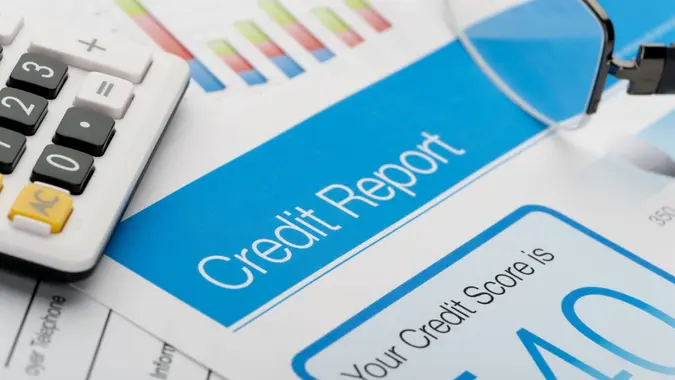Advertiser Disclosure
GOBankingRates works with many financial advertisers to showcase their products and services to our audiences. These brands compensate us to advertise their products in ads across our site. This compensation may impact how and where products appear on this site. We are not a comparison-tool and these offers do not represent all available deposit, investment, loan or credit products.
ChatGPT Reveals: 8 Easiest Ways to Boost Your Credit Score
 Written by
Sean Fisher, AI Editor
Written by
Sean Fisher, AI Editor
 Edited by
Sean Fisher
Edited by
Sean Fisher

Commitment to Our Readers
GOBankingRates' editorial team is committed to bringing you unbiased reviews and information. We use data-driven methodologies to evaluate financial products and services - our reviews and ratings are not influenced by advertisers. You can read more about our editorial guidelines and our products and services review methodology.

20 YearsHelping You Live Richer

Reviewed by Experts

Trusted by Millions of Readers
Boosting your credit score can open doors to better loan terms, lower interest rates, and can even affect your job prospects. ChatGPT looked at data from experts and multiple sources to compile a list of the easiest and most effective ways to boost your credit score to help you with your everyday life. The first thing ChatGPT recommends you do to boost your credit score is the easiest step: check your credit score.
Understanding your credit score is a crucial first step towards improving it. If you’re aiming to elevate your score from 650, considered fair, to 700, which is seen as good, you’ll need to closely examine your credit mix along with other influential factors.
To start, obtain a free copy of your credit report from each of the major credit bureaus–Equifax, Experian, and TransUnion–annually through AnnualCreditReport.com. While these reports won’t display your credit score, they provide all the detailed information that influences it.
For regular updates on your credit score itself, many credit card issuers and banks offer free access to your score as a part of their services. This allows you to monitor your progress and understand how your financial behaviors impact your score over time.
Here are 8 straightforward strategies that can help enhance your credit score effectively:
Pay Bills on Time
Payment history is a significant factor in your credit score and avoiding higher interest rates. Consistently meeting payment deadlines–whether for auto loans, credit card debt, or student loans–is crucial in enhancing your creditworthiness.
Set up reminders or automate payments to ensure you never miss a due date.
Aim to pay more than the minimum due on your credit card bills. This approach helps reduce interest costs over time and lowers your overall debt more quickly.
If you’re only making minimum payments, especially on loans, your payments may primarily cover interest rather than principal, slowing down your debt reduction process.
Increase Credit Limits
Higher credit limits can improve your credit utilization ratio, provided you do not increase your spending. A lower utilization rate can boost your score.
If you’ve had a card for a few months or more that you use fairly regularly and you’ve made all your payments on time, it’s very likely that your lender might increase your credit limit if you request it. This is a great move because it doesn’t require a credit check or an application, there’s no fee, and if you’re approved you’ll increase your open credit and lower your credit utilization ratio.
That all-important ratio is the amount of open credit that you’re utilizing, which accounts for 30% of your FICO score, second only to your payment history.
Find Out:
Keep Old Accounts Open
The length of your credit history impacts your score. Keep older credit accounts open, even if you’re not using them frequently, to extend your credit history.
While it might seem like a good idea to close old or unused credit card accounts to simplify your financial life, doing so can have unintended negative effects on your credit score.
Closing an old credit card account can decrease the average age of your credit accounts. Since the length of your credit history contributes to your credit score, shortening this timeline can potentially lower your score.
It can also reduce your total available credit. If you carry balances on other cards, this reduction in available credit can increase your credit utilization ratio–the percentage of your credit limit you’re using–which is a key factor in your credit score. A higher utilization rate can negatively impact your score.
Pay Off Debt Strategically
Focus on paying down high-interest and high-balance cards first. Reducing your overall debt quickly improves your credit utilization ratio.
Paying off your debt and making timely payments will prove to potential lenders you’re reliable with money. You must also get into the habit of making every payment on time so that you don’t have your credit card company or cell phone provider filing a report with a credit bureau.
Check Credit Reports for Errors
Regularly review your credit reports from the three major credit bureaus–Equifax, Experian, and TransUnion. Dispute any inaccuracies to remove them.
You could have inaccurate or outdated information on your credit report that’s hurting your credit score without even realizing it. For example, your credit report could have a loan that you never took out, there could be a late payment falsely reported or any other possible clerical error.
How to review credit report:
- Request a copy of your credit report.
- Review everything on it, including your basic information and credit history.
- Ensure that all information is accurate.
- Report anything that seems off.
To resolve the issue, you must file a dispute immediately when you find an error or any inaccurate information on your credit report.
You may be required to prove your case with documents. It’s important that you keep copies of your bills, conversations with customer service staff and police reports for any fraud. For example, that fraudulent credit card could still be on your record despite the police report that you submitted. You never know what inaccurate information could hold you back from a better credit score.
Use a Credit Builder Loan
These loans are designed specifically to improve your credit score. The money you borrow is held in an account while you make payments, building your credit history.
Diversify Your Credit Types
Having a mix of credit types–credit cards, student loans, auto loans, mortgages–can positively impact your score. However, take this step only if it makes financial sense.
While you don’t want to get into the habit of opening up random credit cards, you can boost your credit score by adding another type of credit if you don’t have the best mix of credit at the moment.
Become an Authorized User
Being added to a family member’s credit card account can help you benefit from their good credit habits, as long as they pay on time and keep balances low.
Becoming an authorized user on a credit card account held by a family member or friend with excellent credit can potentially boost your credit score. This method can be effective quickly, often within 30 days, but generally, you’ll see improvements by the next billing cycle. This approach requires a high level of trust as your financial actions can directly impact the primary holder’s credit score. It’s crucial to use this privilege responsibly and ensure that it doesn’t negatively affect their credit.
Editor's note: This article was produced via automated technology and then fine-tuned and verified for accuracy by a member of GOBankingRates' editorial team.
Share This Article:




You May Also Like

The One Daily Habit That Predicts Your Financial Health Better Than Your Credit Score
January 23, 2026
6 min Read


6 Smart Ways To Get Approved for Loans and Credit Cards with a Low Credit Score
January 15, 2026
6 min Read



Car Insurance Companies That Don't Factor in Your Credit Score -- And Can Save You Big Money
December 01, 2025
6 min Read

The Unexpected Shopping Habits Researchers Say Could Signal Creditworthiness
November 24, 2025
6 min Read


I Asked an AI Money Assistant How To Quickly Raise My Credit Score - Here's What It Said
November 07, 2025
6 min Read



2 Common Credit Score Myths That Can Tank Your Finances -- And How To Fix Them
October 15, 2025
6 min Read


Your Bank May Penalize You for Using Buy Now, Pay Later: Here's What You Need To Know
August 12, 2025
6 min Read

Make your money work for you
Get the latest news on investing, money, and more with our free newsletter.
By subscribing, you agree to our Terms of Use and Privacy Policy. Unsubscribe at any time.


Thanks!
You're now subscribed to our newsletter.
Check your inbox for more details.



Sending you timely financial stories that you can bank on.
Sign up for our daily newsletter for the latest financial news and trending topics.
For our full Privacy Policy, click here.
Looks like you're using an adblocker
Please disable your adblocker to enjoy the optimal web experience and access the quality content you appreciate from GOBankingRates.
- AdBlock / uBlock / Brave
- Click the ad blocker extension icon to the right of the address bar
- Disable on this site
- Refresh the page
- Firefox / Edge / DuckDuckGo
- Click on the icon to the left of the address bar
- Disable Tracking Protection
- Refresh the page
- Ghostery
- Click the blue ghost icon to the right of the address bar
- Disable Ad-Blocking, Anti-Tracking, and Never-Consent
- Refresh the page



